Related Research Articles
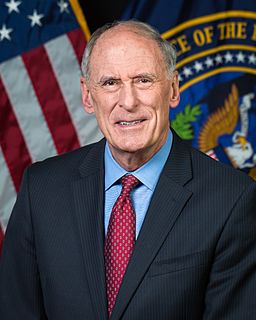
Daniel Ray Coats is an American politician, attorney, and former diplomat. From 2017 to 2019, he served as the Director of National Intelligence in the Trump administration. A member of the Republican Party, he served as a United States Senator from Indiana from 1989 to 1999 and again from 2011 to 2017. He was the United States Ambassador to Germany from 2001 to 2005, and a member of the United States House of Representatives from 1981 to 1989. Coats served on the United States Senate Select Committee on Intelligence while in the U.S. Senate.
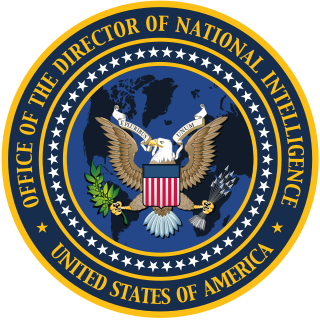
The Director of National Intelligence (DNI) is a senior, cabinet-level United States government official, required by the Intelligence Reform and Terrorism Prevention Act of 2004 to serve as executive head of the United States Intelligence Community (IC) and to direct and oversee the National Intelligence Program (NIP). The DNI also serves, upon invitation, as an advisor to the President of the United States and the executive offices of the National Security Council and the Homeland Security Council about all intelligence matters. The DNI, supported by the Office of the Director of National Intelligence (ODNI), produces the President's Daily Brief (PDB), a top-secret document including intelligence from all IC agencies, given each morning to the President.

The United States Intelligence Community (IC) is a group of separate United States government intelligence agencies and subordinate organizations, that work separately and together to conduct intelligence activities to support the foreign policy and national security of the United States. Member organizations of the IC include intelligence agencies, military intelligence, and civilian intelligence and analysis offices within federal executive departments.

The United States Senate Select Committee on Intelligence is dedicated to overseeing the United States Intelligence Community—the agencies and bureaus of the federal government of the United States that provide information and analysis for leaders of the executive and legislative branches. The Committee was established in 1976 by the 94th Congress.

The National Intelligence Council (NIC), established in 1979 and reporting to the Director of National Intelligence, bridges the United States Intelligence Community (IC) with policy makers in the United States. The NIC produces the "Global Trends" report every four years beginning in 1997, for the incoming President of the United States. Their work is based on intelligence from a wide variety of sources that includes experts in academia and the private sector. NIC documents and reports which are used by policymakers, include the National Intelligence Estimate and the Global Trends reports delivered every four years. The NIC's goal is to provide policymakers with the best available information, that is unvarnished, unbiased and without regard to whether the analytic judgments conform to current U.S. policy.

The United States House Permanent Select Committee on Intelligence (HPSCI), also known as the House Intelligence Committee, is a committee of the United States House of Representatives, currently chaired by Adam Schiff. It is the primary committee in the U.S. House of Representatives charged with the oversight of the United States Intelligence Community, though it does share some jurisdiction with other committees in the House, including the Armed Services Committee for some matters dealing with the Department of Defense and the various branches of the U.S. military.

Joseph Maguire is an American officer who served as Director of the National Counterterrorism Center and Acting Director of National Intelligence under President Donald Trump. He retired from the United States Navy as a Vice Admiral in 2010 after 36 years of military service. Prior to retiring from active duty, he was the Deputy Director for Strategic Operational Planning at National Counterterrorism Center (NCTC).

John Owen Brennan is a former American intelligence officer who served as the Director of the Central Intelligence Agency (CIA) from March 2013 to January 2017. He served as chief counterterrorism advisor to U.S. President Barack Obama, with the title Deputy National Security Advisor for Homeland Security and Counterterrorism, and Assistant to the President. Previously, he advised Obama on foreign policy and intelligence issues during the 2008 election campaign and presidential transition.
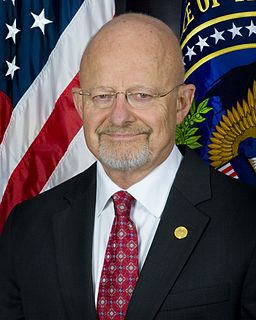
James Robert Clapper Jr. is a retired lieutenant general in the United States Air Force and former Director of National Intelligence. Clapper has held several key positions within the United States Intelligence Community. He served as director of the Defense Intelligence Agency (DIA) from 1992 until 1995. He was the first director of defense intelligence within the Office of the Director of National Intelligence and simultaneously the Under Secretary of Defense for Intelligence. He served as the director of the National Geospatial-Intelligence Agency (NGA) from September 2001 until June 2006.
United States Intelligence Community Oversight duties are shared by both the executive and legislative branches of the government. Oversight, in this case, is the supervision of intelligence agencies, and making them accountable for their actions. Generally oversight bodies look at the following general issues: following policymaker needs, the quality of analysis, operations, and legality of actions.

The United States intelligence budget comprises all the funding for the 16 agencies of the United States Intelligence Community. These agencies and other programs fit into one of the intelligence budget's two components, the National Intelligence Program (NIP) and the Military Intelligence Program (MIP). As with other parts of the federal budget, the US intelligence budget runs according to the Fiscal year (FY), not the calendar year. Before government finances are spent on intelligence, the funds must first be authorized and appropriated by committees in both the United States House of Representatives and the United States Senate.
The Boren-McCurdy intelligence reform proposals were two legislative proposals from Senator David Boren and Representative Dave McCurdy in 1992. Both pieces of legislation proposed the creation of a National Intelligence Director. Neither bill passed into law.
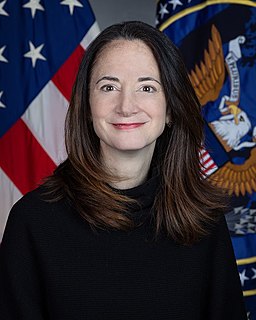
Avril Danica Haines is an American lawyer and senior government official who currently serves as the Director of National Intelligence in the Biden administration. She is the first woman to serve in this role. Haines previously served as Deputy National Security Advisor and Deputy Director of the Central Intelligence Agency (CIA) in the Obama administration; the first woman to hold either position. Prior to her appointment to the CIA, she served as Deputy Counsel to the President for National Security Affairs in the Office of White House Counsel.

John Lee Ratcliffe is an American politician and attorney who served as the Director of National Intelligence from 2020 to 2021. He previously served as the U.S. representative for Texas's 4th district from 2015 to 2020. During his time in Congress, Ratcliffe was regarded as one of the most conservative members. Ratcliffe also served as Mayor of Heath, Texas, from 2004 to 2012 and as acting United States Attorney for the Eastern District of Texas from May 2007 to April 2008.

The Intelligence Authorization Act for Fiscal Year 2014 is a U.S. public law that authorizes appropriations for fiscal year 2014 for intelligence activities of the U.S. government. The law authorizes there to be funding for intelligence agencies such as the Central Intelligence Agency or the National Security Agency, but a separate appropriations bill would also have to pass in order for those agencies to receive any money.
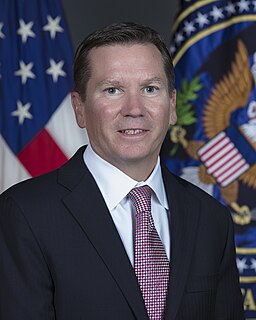
Michael Kevin Atkinson is an American attorney. He worked for the United States Department of Justice for approximately 15 years, before becoming the second Inspector General of the Intelligence Community. He assumed office on May 17, 2018.
Shelby Pierson is the top election security official of the American intelligence community, the chair of the Election Executive and Leadership Board. Director of National Intelligence Dan Coats instituted the position and appointed Pierson to fill it in July 2019. The board includes representatives from the intelligence community and other federal agencies coordinating on election security.
Russian interference in the 2020 United States elections was a matter of concern at the highest level of national security within the United States government, in addition to the computer and social media industries. In February and August 2020, United States Intelligence Community (USIC) experts warned members of Congress that Russia was interfering in the 2020 presidential election in then-President Donald Trump's favor. USIC analysis released by the Office of the Director of National Intelligence (DNI) in March 2021 found that proxies of Russian intelligence promoted and laundered misleading or unsubstantiated narratives about Joe Biden "to US media organizations, US officials, and prominent US individuals, including some close to former President Trump and his administration." The New York Times reported in May 2021 that federal investigators in Brooklyn began a criminal investigation late in the Trump administration into possible efforts by several current and former Ukrainian officials to spread unsubstantiated allegations about corruption by Joe Biden, including whether they had used Trump personal attorney Rudy Giuliani as a channel.
The Russian bounty program is an alleged project of Russian military intelligence to pay bounties to Taliban-linked militants for killing American and other allied service members during the war in Afghanistan. The existence of the alleged program was reported in the media in 2020 and became an issue in the 2020 presidential election campaign. In June 2020, The Washington Post reported that intelligence suggesting the existence of a bounty operation dated to as early as 2018. The Washington Post and Associated Press both reported that Trump administration White House officials were informed of the intelligence reports in early 2019. In June 2020, The New York Times reported that U.S. intelligence agencies had assessed, several months earlier, that Unit 29155 of the Russian military intelligence agency GRU had secretly offered Taliban-associated militants bounties to kill U.S. troops and other coalition personnel in Afghanistan, including during peace talks with the Taliban. The New York Times reported that "Officials said there was disagreement among intelligence officials about the strength of the evidence about the suspected Russian plot." Defense Department officials then reported that U.S. military intelligence was unable to corroborate the reported program. In April 2021, the U.S. government reported that the U.S. intelligence community only had "low to moderate confidence" in the bounty program allegations.

Stacey A. Dixon is an American intelligence official and principal deputy director of national intelligence in the Biden Administration since August 4, 2021.
References
- ↑ Negroponte, John D. "Annual Threat Assessment of the Director of National Intelligence for the Senate Select Committee on Intelligence" (PDF). US Federal Government. Retrieved 19 June 2017.
- ↑ "Annual Threat Assessment of the U.S. Intelligence Community" (PDF).
- ↑ Haines, Avril. "2021 Annual Threat Assessment of the U.S. Intelligence Community".
- ↑ Coats, Daniel R. "Statement for the Record Worldwide Threat Assessment of the US Intelligence Community" (PDF).
- ↑ McQuade, Alex R. "2016 Worldwide Threat Assessment of the U.S. Intelligence Community". LawfareBlog.com . Retrieved 19 June 2017.
- ↑ Malakoff, David. "NASA U.S. spy agencies wimp out on science of climate change, but still say it's a security threat". Science. AAAS. Retrieved 19 June 2017.
- ↑ Werrell and Francesco. "Climate Change in the Worldwide Threat Assessment of the US Intelligence Community". The Center for Climate and Security.
- ↑ John Walcott The Trump Administration Is Stalling an Intel Report That Warns the U.S. Isn’t Ready for a Global Pandemic March 9, 2020 TIME.com